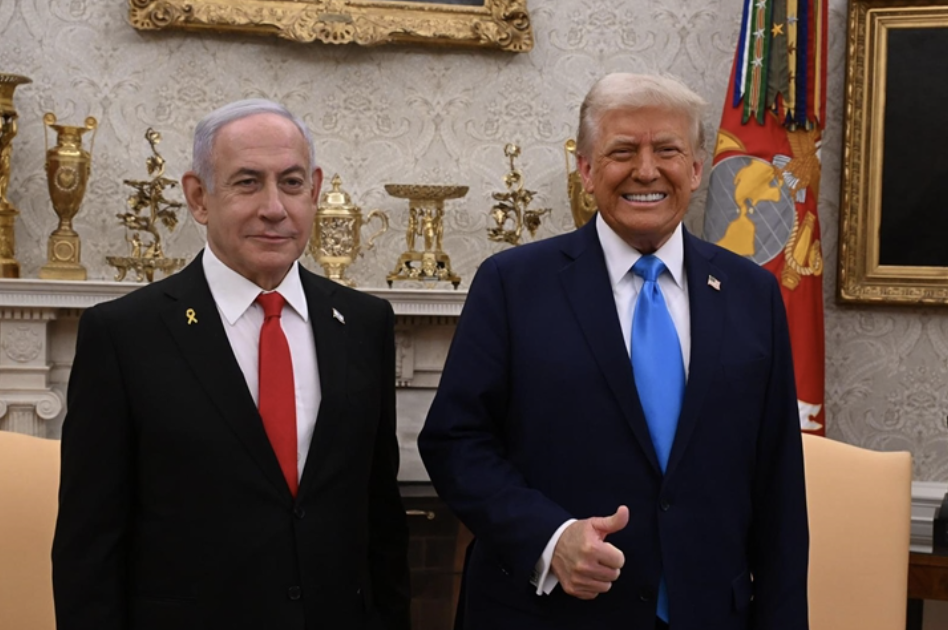Trump, Netanyahu, and the Turkey-Syria Equation: A New Phase of Old Tensions
 trump netanyahu
trump netanyahu
When former U.S. President Donald Trump welcomed Israeli Prime Minister Benjamin Netanyahu to the White House this week, the usual theater of diplomacy was on full display: smiles, praise, veiled warnings, and plenty of cameras. But beneath the surface, the meeting revealed something far more consequential—a shifting power play over Syria, with Turkey caught squarely in the middle.
To recap, after Israeli air force bombed a Syrian airbase, which was about to be turned over to Turkish control, Ankara conveyed its desire to deescalate through Foreign Affairs Minister Hakan Fidan. In his meeting with Trump, Netanyahu responded in kind. However, there is little doubt that the strategic competition between two Eastern Mediterranean powers is expanded from Gazza to Syria.
What transpired in the summit?
Netanyahu reportedly asked Trump to mediate with Turkish President Recep Tayyip Erdoğan regarding Ankara’s role in Syria. That request alone speaks volumes. For years, Israel has watched Turkey expand its military presence across northern Syria with increasing concern, particularly near areas where Kurdish groups operate. For Israel, these groups—especially the U.S.-backed Syrian Democratic Forces—serve as a buffer not just against ISIS, but also against Iranian militias operating deep inside Syrian territory. Turkey, however, sees these same forces as affiliates of the PKK, a group it considers a terrorist threat.
Netanyahu’s pivot to Trump signals that he sees Ankara’s moves as a serious enough threat to warrant outside mediation—but perhaps more importantly, it reveals Israel’s calculation that Trump, not Biden, is the leader who can get Erdoğan to listen.
Trump’s response was vintage Trump: a strange mix of personal warmth and strategic muscle-flexing. He praised Erdoğan as “a strong leader,” even someone he “had a great relationship with.” But he also reminded everyone of the Andrew Brunson saga—a 2018 standoff in which Turkey detained an American pastor, only to release him under U.S. economic pressure. The message was clear: Erdoğan may be tough, but Trump is tougher.
So what does all this mean?
First, it suggests that a second Trump presidency would likely return to a transactional, pressure-heavy approach toward Turkey. The former president still sees economic leverage—tariffs, sanctions, trade threats—as his favorite foreign policy hammer, especially when it comes to Erdoğan. This could have real consequences if Turkey attempts another military operation in Syria that threatens the fragile status quo.
Second, Netanyahu’s ask wasn’t just about diplomacy—it was about preemptive containment. Israel is worried that Ankara’s next move in Syria could disrupt the semi-autonomous Kurdish zones near the Israeli-friendly northeast, destabilize the balance of power, and possibly open more space for Iranian proxies to operate. In a region where the enemy of your enemy is rarely your friend, Israel sees Turkey as a wildcard that needs managing.
Third, Trump’s answer implies that his Syria policy hasn’t changed much: reduce U.S. footprint, keep the oil fields quiet, and make sure Kurdish allies don’t get crushed—preferably without too much American blood or treasure involved. If mediation can achieve that, so be it. If not, tariffs are always on standby.
For Turkey, the message is mixed. On one hand, Trump’s willingness to engage Erdoğan directly offers a diplomatic off-ramp that doesn’t currently exist with Biden. On the other hand, the memory of Trump’s swift economic punishment in 2018 still lingers in Ankara’s corridors of power. Erdoğan knows that flattery with Trump works—until it doesn’t.
What this all adds up to is a high-stakes recalibration. With Trump now back in office, Turkey faces a strategic crossroads. It may opt to accelerate its Syria operations under the assumption that the new U.S. administration will tolerate a more assertive Turkish footprint in exchange for broader regional cooperation. Alternatively, Ankara might pursue a more cautious strategy—testing the waters for a deal that trades restraint in Syria for greater diplomatic or economic leverage with Washington.
What’s certain is that Israel has made its position unmistakably clear: it views Turkey’s Syria policy not just as a regional headache, but as a strategic threat that needs active U.S. involvement. By appealing directly to Trump, Netanyahu is betting that the U.S. will not only return to a more transactional Middle East policy, but also act as a counterweight to Turkish ambitions—before they become irreversible.
Whether that happens through mediation, pressure, or backchannel deals remains to be seen. But the Trump-Netanyahu meeting makes one thing clear: Syria’s war may be far from over, and the next phase could hinge less on Damascus and more on what’s said in Washington.
PA Turkey staff
IMPORTANT DİSCLOSURE: PA Turkey intends to inform Turkey watchers with diverse views and opinions. Articles in our website may not necessarily represent the view of our editorial board or count as endorsement.
Follow our English language YouTube videos @ REAL TURKEY: https://www.youtube.com/channel/UCKpFJB4GFiNkhmpVZQ_d9Rg
And content at Twitter: @AtillaEng


